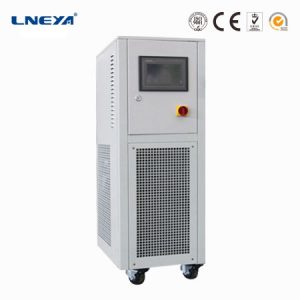Manufacturer explains what are the influences of the oil level and oil difference of the chiller?
The chiller manufacturer tells everyone that in addition to the refrigeration system, the lubricating oil system is also an important part, with its own oil reservoir and special oil cooler. Therefore, we must understand the influence of the oil level and oil difference of the chiller?

Oil level
It refers to the level of lubricating oil in the oil storage container. The oil storage containers of low-temperature chillers are equipped with oil level display devices. Generally, it is stipulated that the oil level in the oil storage container should be 5mm above and below the central horizontal line of the sight glass. The purpose of specifying the oil level is to ensure that when the oil pump is working, the amount of oil required to form an oil circulation is sufficient. If the oil level is too low, it is easy to cause insufficient oil pumps, which may cause operation failures or damage the equipment.
Oil pressure difference
It is the guarantee that lubricating oil needs to overcome the flow resistance when it flows to various working parts in the pipeline of the oil system under the drive of the oil pump. Without sufficient oil pressure difference, it is impossible to guarantee that the lubrication system of cold and low temperature chiller has sufficient lubrication and cooling oil and the power required to drive the energy regulating device. Therefore, the low temperature chiller manufacturer reminds that the oil pressure difference of the oil system It must be ensured in a reasonable range so that the moving parts of the unit can be fully lubricated and cooled, and the energy adjustment device can be manipulated flexibly.
Oil temperature
Oil temperature refers to the temperature of lubricating oil when the chiller is working. The oil temperature has an important influence on the viscosity of the lubricating oil. If the oil temperature is too low, the viscosity of the oil will increase, the fluidity will decrease, and it is not easy to form a uniform oil film, so the expected lubrication effect cannot be achieved, and it will also cause the oil flow speed to decrease, reduce the lubrication volume, and the power consumption of the oil pump. Increase; if the oil temperature is too high, the viscosity of the oil will decrease, and the oil film will not reach a certain thickness, making it difficult for the running parts to withstand the necessary working pressure, causing deterioration of the lubrication condition, aggravation of the moving parts, and failure of the chiller.
So let’s not say much, the chiller manufacturer believes that everyone also understands the impact of oil level and oil difference. In order to better use the chiller, you still need to understand these operating points carefully!
Related recommendations
-
What are the system components of various distillation devices?
8561. A complete set of short-path distillation equipment: including short-path evaporator, heating system, feeding system, cooling system, vacuum system, material collection unit, etc.; 2. A complete set of thin film distillation equipment: includin...
View details -
Daily Maintenance of Low Temperature Freezer
985Low temperature freezer, which is also called industrial refrigerator, is mainly used for industrial cold treatment, the increase of wear-resisting property and friction of metals. Guanya Refrigeration Technology Co., Ltd in Wuxi is a leading role...
View details -
Laboratory dedicated chiller pressure description
1096The laboratory-specific chiller is one of the more popular equipments in the mechanical equipment industry. For this reason, the relevant pressure instructions have been specially compiled to help you better understand the laboratory-specific chil...
View details -
Semiconductor Temperature Forcing System Thermal Flow Hood for DUT Testing
927The semiconductor temperature forced system (TFS), thermal flow meter and thermal flow hood are important equipment used to test the performance of semiconductor devices under different temperature conditions. These equipment are usually u...
View details
 LNEYA Industrial Chillers Manufacturer Supplier
LNEYA Industrial Chillers Manufacturer Supplier












